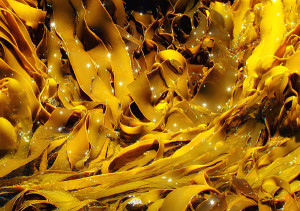Kelps are large seaweeds (algae) belonging to the brown algae(Phaeophyceae) in the order Laminariales. There are about 30 different genera.
Contents
Uses
Kelp is used as a thickener in many foods you may eat, including ice cream and salad dressing. But you can eat natural kelp in many different forms, including:
- raw
- cooked
- powdered
- in supplements
Benefits
Vitamins and Minerals
Kelp contains many vitamins, especially B vitamins, which are essential for cellular metabolism and providing your body with energy. It also contains vitamins C and E, which are both strong antioxidants and promote blood vessel health. Minerals, such as calcium, boron and magnesium are plentiful in kelp; they are necessary for strong bones and normal muscle function.
Sodium Alginate
Kelp, like other seaweeds, is rich in sodium alginate, which is an element effective at protecting the body from radiation and removing it. According to a 1964 study published in the “Canadian Medical Association Journal,” sodium alginate derived from kelp reduced radioactive strontium absorption in the intestines by 50 to 80 percent. Specifically, sodium alginate allows calcium to be absorbed through the intestinal wall while binding most of the strontium, which is excreted from the body.
Iodine
Seaweed is also a rich source of iodine, which is a crucial nutrient for the thyroid. A deficiency in iodine leads to goiter, or swelling of the thyroid, and metabolism disruption. Iodine is the main element used to synthesize the thyroid hormones thyroxine and triiodothyronine. The thyroid gland absorbs iodide from the bloodstream to make its hormones, although the process is regulated by the pituitary gland. Consuming iodine from plants like kelp also helps reduce the effects of radiation exposur
Chlorophyll
Chlorophyll is used by plants to convert sunlight into energy, and it contains many nutrients, including antioxidants and amino acids. Chlorophyll is also similar in composition to human blood, so consumption of it can stimulate red blood cell production, which can increase oxygenation around the body. Kelp contains plentiful amounts of chlorophyll
Caution
Kelp contains a large amount of iodine, which can cause side effects. Although some iodine is essential for thyroid function, ingesting too much of it can negatively affect thyroid function, causing hypo- or hyper-thyroidism. Many thyroid specialists suggest that adults consume about 150 micrograms of iodine daily, although that is well below the level that could cause side effects. Table salt is iodized, so you should balance your kelp consumption against your salt intake.
Kelp might also contain arsenic, and consuming large amounts of kelp supplements might lead to arsenic poisoning.
Interactions
- Digoxin (Lanoxin) interacts with Kelp
Laminaria contains large amounts of potassium. Large amounts of potassium can increase the effects and side effects of digoxin (Lanoxin). Do not take laminaria if you are taking digoxin (Lanoxin). - Medications for high blood pressure (ACE inhibitors) interacts with Kelp
Laminaria contains large amounts of potassium. Some medications for high blood pressure can increase potassium levels in the blood. Taking laminaria along with some medications for high blood pressure might cause too much potassium in the blood.Some medications for high blood pressure include captopril (Capoten), enalapril (Vasotec), lisinopril (Prinivil, Zestril), ramipril (Altace), and others. - Potassium supplements interacts with Kelp
Laminaria contains large amounts of potassium. Taking potassium supplements along with laminaria might cause too much potassium to be in the body. Do not take laminaria if you are taking potassium supplements. - Thyroid hormone interacts with Kelp
The body naturally produces thyroid hormones. Laminaria might increase how much thyroid hormone the body produces. Taking laminaria along with thyroid hormone pills might increase the effects and side effects of thyroid hormones. - Water pills (Potassium-sparing diuretics) interacts with Kelp
Laminaria contains large amounts of potassium. Some “water pills” can also increase potassium levels in the body. Taking some “water pills” along with laminaria might cause too much potassium to be in the body.Some “water pills” that increase potassium in the body include amiloride (Midamor), spironolactone (Aldactone), triamterene (Dyrenium), and others.
Other names
Algue Brune, Brown Algae, Brown Seaweed, Hai Dai, Kombu, Kun Bu, Laminaire, Laminaire Digitée, Laminaire Japonaise, Laminaria digitata, Laminaria japonica, Laminariae stipites, Limu, Makombu Thallus, Sea Girdles, Seagirdle Thallus, Thallus Laminariae
Reference
Source: WebMD, http://www.webmd.com/vitamins-supplements/ingredientmono-542-laminaria.aspx?activeingredientid=542&activeingredientname=laminaria
LiveStrong, http://www.livestrong.com/article/354597-the-health-benefits-side-effects-of-kelp/

